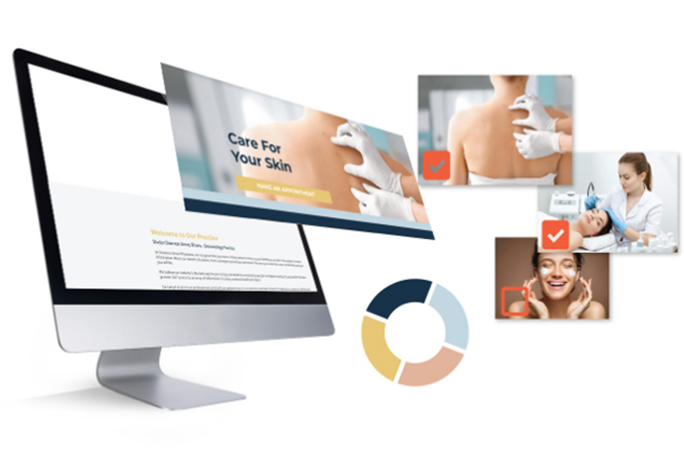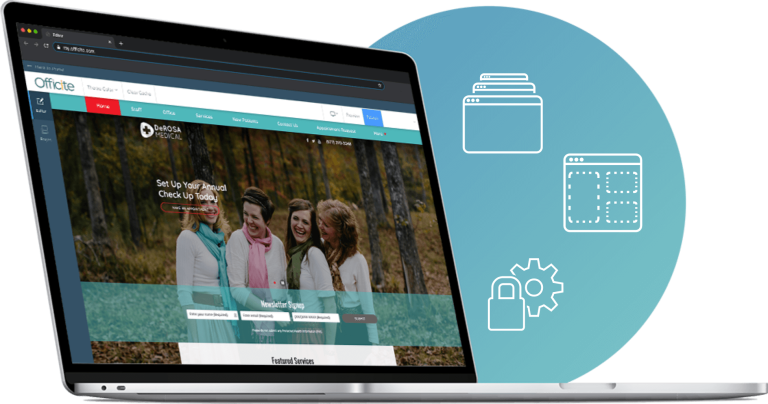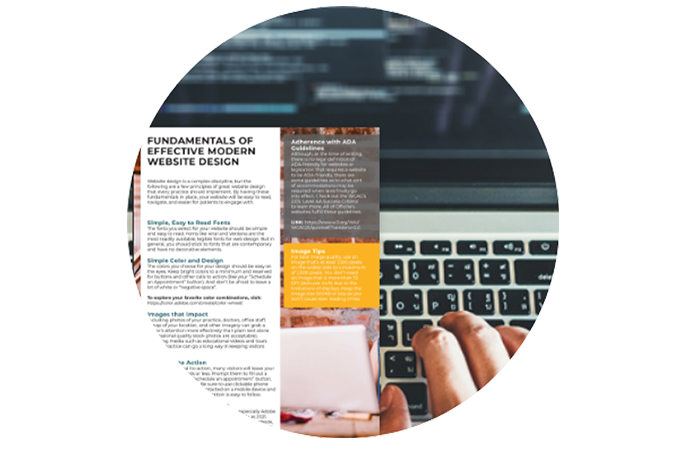





At Guru Healthcare, we understand the importance of a robust online presence for your medical practice. We offer premium website design solutions tailored to your specific needs and specialty. Our extensive portfolio features a wide range of high-quality layouts, allowing us to create a website that perfectly reflects your unique practice. Whether you're a family clinic, a specialized surgeon, or anything in between, we'll craft a design that resonates with your target audience and conveys your brand identity.
Our team incorporates the latest web design trends into every project. This ensures your website is aesthetically pleasing and packed with user-friendly features that enhance the patient experience. Seamless navigation, clear calls to action, and optimized loading times are just a few elements we prioritize to keep visitors engaged and informed.
A mobile-responsive website is also essential for SEO success. Guru Healthcare ensures that your medical practice website adjusts flawlessly across all devices, from desktops to tablets and smartphones. This allows potential patients to easily access your practice information and services, regardless of how they browse.
Guru Healthcare's medical web design goes beyond aesthetics. We incorporate SEO best practices to help your website rank higher in search engine results pages (SERPs). This translates to increased online visibility, attracting more new patients who are actively seeking your services.
Investing in a modern medical website design from Guru Healthcare offers numerous advantages. A user-friendly website makes it easy for patients to find the needed information, schedule appointments, and learn about your practice.
Increased online visibility attracts new patients who are actively searching for medical services. A professional and well-designed website portrays your practice as trustworthy and reliable, fostering positive patient perception. Your website can serve as a 24/7 communication channel, allowing patients to access appointment bookings, insurance information, and FAQs.
At Guru Healthcare, we're dedicated to helping medical practices thrive in the digital age. Our team of experienced designers and developers understands the healthcare industry's unique needs. We'll work closely with you to create a modern and functional website that reflects your brand and exceeds patient expectations. Contact a Web Presence Advisor today.
Modern patients increasingly turn to the internet to research symptoms, find specialists and schedule appointments.
Guru Healthcare understands this critical shift and offers a comprehensive medical website design service designed to empower your practice and attract new patients.
First impressions matter a lot online. Outdated website design reflects poorly on your practice and can deter potential patients from engaging with your services. Guru Healthcare offers a vast collection of modern website themes, all meticulously crafted to meet the latest design standards. These themes are clean, user-friendly, and aesthetically pleasing, creating a positive first impression for online visitors.
A one-size-fits-all approach doesn't work in healthcare, and neither does it work for medical website design. At Guru Healthcare, we understand that each practice has unique specialties, services, and brand identity. That's why we go beyond simply offering pre-designed templates.
We take the time to understand your practice, target audience, and brand goals. Our experienced designers then work with you to customize a website that perfectly reflects your practice's individuality. This personalized approach ensures your website resonates with your ideal patients and fosters a sense of trust.
While a modern design is crucial for a medical website, a strong foundation of technical features is equally important. Guru Healthcare goes beyond aesthetics to provide your practice with a website that looks good, functions flawlessly, and delivers exceptional patient experiences.
We offer a vast collection of website designs crafted for medical practices. These designs are optimized for performance, ensuring fast loading times and a seamless user experience across all devices. Furthermore, they can be customized to reflect your unique practice and brand identity. This ensures patients receive a professional and informative online experience tailored to your services.
Beyond website design, Guru Healthcare offers expert web development services designed to enhance your practice's operations and patient acquisition. Our team stays current on the latest web technologies and can integrate functionalities that streamline your practice workflow. This might include online appointment scheduling, patient portals for secure communication, or online forms for appointment requests and insurance information gathering. These features improve patient convenience and free up valuable time for your staff, allowing them to focus on patient care.
Guru Healthcare understands the power of content in attracting new patients. That's why we don't limit the number of pages you can create on your website. This allows you to develop comprehensive content that caters to your specific audience and addresses their search queries. In addition to dedicated service pages, you can establish a blog section to provide valuable health information, patient testimonials, and practice updates. This educates potential patients and positions your practice as a trusted authority in the field. Furthermore, you can integrate third-party widgets and forms seamlessly into your website, offering patients additional features and functionalities.
Understanding how patients navigate your website is crucial for optimizing their online experience. Our online doctor portal also provides comprehensive website analytics to track traffic and trends. It also allows you to watch user behavior and the patient's online journey as they continue interacting with you online through your medical practice website.
These analytical insights empower you to make informed decisions about website content, design elements, and functionalities. By tailoring your website based on accurate user data, you can ensure it caters to patient needs and maximizes conversions.
Patient privacy and data security are paramount in the healthcare industry. Guru Healthcare prioritizes these concerns by equipping all our websites with HTTPS security protocols. This encrypts sensitive information between your website and patients, safeguarding their data and fostering trust in your practice. Additionally, we offer reliable website hosting solutions, ensuring your website remains accessible and operational 24/7. This lets you focus on running your practice with the peace of mind that your online presence is always secure and functioning flawlessly.
Managing your online presence shouldn't feel like a chore. Guru Healthcare's user-friendly online doctor portal lets you control your website content easily. This intuitive platform enables you to update essential information like practice hours, staff profiles, and service offerings without relying on technical expertise. You can also add news announcements, blog posts, and patient testimonials to keep your website content fresh and engaging. This level of control empowers you to maintain a dynamic online presence that reflects the latest developments within your practice.
Creating comprehensive and informative content is crucial for attracting new patients. With Guru Healthcare, you're not limited by how many website pages you can make. This allows you to develop content that caters to your specific audience and addresses their search queries. For instance, you can create dedicated pages for each medical service you offer, outlining procedures, benefits, and patient expectations. In addition to service pages, you can establish a blog section to provide valuable health information and position yourself as a trusted authority. This content-rich approach educates potential patients and improves your website's search engine ranking, making it easier for patients to search for relevant keywords to find your practice.
While modern design and user-friendly functionality are essential, Guru Healthcare takes medical website design further. We understand that a successful online presence requires a holistic approach. We can work with you to incorporate best practices for medical SEO to ensure your website ranks higher in search results. This increases your online visibility, allowing you to reach a wider audience of potential patients actively seeking your services. Additionally, we can explore integrating online appointment scheduling functionalities into your website, streamlining the patient experience and attracting individuals who prioritize convenience.
A well-designed medical website is an investment in the future of your practice. It serves as a powerful marketing tool, fostering patient trust and acquisition. Need more info? Speak to one of our friendly Web Presence Advisors today.
Join over 8,000 healthcare practices and leverage Guru Healthcare's expertise to attract new patients and boost your bottom line. We partner with leading medical associations, ensuring our solutions align with industry best practices.
Guru Healthcare transforms your website into a powerful growth engine. We connect local patients searching online with your practice, maximizing your online visibility. Furthermore, we equip your website with integrated features to streamline operations and enhance patient convenience. This includes online appointment scheduling, secure fillable forms for patient information, and even e-commerce solutions.
Partner with Guru Healthcare and unlock the potential of your online presence. Chat with one of our friendly Web Presence Advisors today.